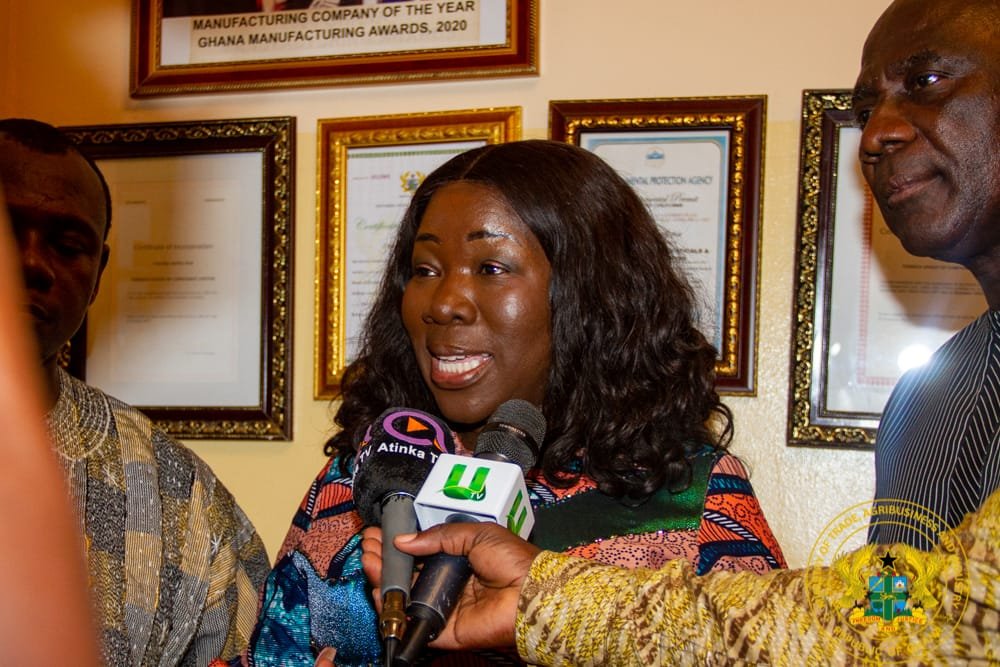The Minister for Trade, Agribusiness and Industry, Hon. Elizabeth Ofosu-Adjare, has reaffirmed Government’s commitment to strengthening Ghana’s industrial base as she paid separate working visits to Wahu Company Limited and the Entrance Pharmaceutical & Research Centre in Accra on Friday, 21st November, 2025.
The visits formed part of her ongoing industrial engagement tour aimed at deepening collaboration with local manufacturers, understanding their operational challenges, and identifying policy interventions needed to support business expansion, exports, and job creation. After the sit-down discussions at both companies, the Minister also toured the factories to observe production processes, product lines, and general operational facilities.
Engagement at Wahu Company Limited
At Wahu, the company co-founder and CEO Madam, Valerie Labi, outlined major growth strides recorded over the past few years, including increased production capacity, product diversification, and plans for further expansion into both local and export markets.
She explained that the facility has the capacity to assemble up to 20,000 vehicles annually, runs entirely on solar energy, and can operate on a 24-hour cycle. In fact, Wahu already contributes to the government’s 24-hour economy agenda: their riders operate around the clock, and the factory itself works 24 hours to meet production targets.
Wahu is deeply invested in local talent development. In partnership with the UK’s FCDO, Ghanaian engineers are receiving advanced training in battery technology, with train-the-trainer programmes now being run locally. Their long-term plan is to localise battery pack production in Ghana, she said.
Currently employing 550 people — 500 riders and 50 staff — Wahu aims to become one of Ghana’s largest youth employers by end of 2026. Valerie also announced a new OEM partnership with Ox Delivers, which will see the production of electric flat-pack agricultural trucks moved from the UK to Ghana. Their expanded fleet now serves delivery, okada mobility, and agricultural value chains like soybeans, chilli peppers, and cocoa.
On policy needs, she stated clearly that Wahu faces heavy taxation and lacks access to VAT exemptions available to traditional OEMs, simply because they are not covered under the Ghana Automotive Development Policy. Despite being local manufacturers, they had to register as a Free Zones company to enable it exports to countries like Liberia, Zambia, and Togo. She recommended two policy directions:
• A clear definition within the automotive framework for companies like Wahu, and
• An innovation sandbox under the automotive policy to support emerging EV technologies, battery innovation, talent development, and component localisation.
She added that Wahu also requires access to long-term affordable debt to support vehicle financing, despite an existing partnership with DBG. They are also exploring expanding their financing software to include other OEMs.
Madam Valerie ended by expressing appreciation to the Free Zones Authority and the Ministry of Trade, Agribusiness & Industry for ongoing engagement as they work toward the new Ghana Automotive Development Platform.

The Minister commended Wahu for its resilience and innovation, assuring that Government is fully committed to creating an enabling environment for indigenous companies to thrive. She emphasized that industrial development remains central to Ghana’s economic transformation agenda and reiterated her openness to working closely with the private sector to address bottlenecks affecting their operations.
Visit to Entrance Pharmaceutical & Research Centre
At Entrance Pharmaceuticals, CEO Elder Dr.. Samuel Amo Tobbin, and his executive team outlined the company’s extensive operations, including large-scale exports facilitated through the Free Zones regime. They praised the Ministry for the continuous support they receive through the Free Zones Authority, particularly in the importation of critical raw materials and logistics.
However, they raised key concerns, including the delayed inflow of payments from some countries within the sub-region despite meeting export requirements, a situation affecting their cash flow. Another major industry-wide challenge tabled was the absence of a maize starch processing plant in West Africa, although maize starch remains one of the most essential ingredients in pharmaceutical production.
They appealed for government support to attract private investment into maize starch processing, which would benefit not only the pharmaceutical sector but also beverage and ethanol producers.
Mr. Tobbin further highlighted the poor condition of the access road leading to the company’s facility despite the plant’s status as one of the largest pharmaceutical manufacturing hubs in Ghana—frequently visited by international regulatory bodies such as the WHO, U.S. FDA, and Geneva FDA.
Responding, Hon. Ofosu-Adjare described the suggestions as “timely, practical and economically strategic,” emphasising that Ghana must begin producing key raw materials locally to support industrialization, enhance competitiveness under the AfCFTA, and promote value addition.
She revealed that during the government’s recent investment missions abroad, several sectors—including pharmaceuticals, textiles, and manufacturing—received strong investor interest, adding that maize starch production presents a bankable project with readily available market demand. She gave firm assurance that her Ministry will fast-track efforts to secure investors for the project.
On the issue of delayed payments from export destinations, the Minister pledged immediate follow-up, noting that the President’s Accelerated Exports Development Programme places high priority on supporting Ghanaian exporters, ” The President of the Republic John Dramani Mahama wants Ghana to be the Net exporter of Pharmaceuticals”.
She promised to engage her colleague Trade Ministers across the sub-region to ensure prompt settlement of obligations to Ghanaian manufacturers.
Touching on the road infrastructure challenge, she expressed confidence that the Ministry of Roads, under the leadership of Hon. Kwame Agbodza, will prioritise the rehabilitation of the Entrance Pharma access road due to the industrial and economic relevance of the facility.
The Minister commended Entrance Pharma for running a highly productive, multi-shift system and for its commitment to quality, responsible production, and dignified treatment of workers. She assured them of open-door access to resolve emerging issues quickly in order to sustain production levels and support job creation for young people.








